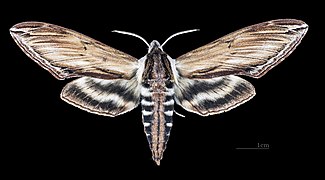Sphinx kalmiae
Appearance
This article needs additional citations for verification. (July 2024) |
| Laurel sphinx | |
|---|---|

| |
| Scientific classification | |
| Domain: | Eukaryota |
| Kingdom: | Animalia |
| Phylum: | Arthropoda |
| Class: | Insecta |
| Order: | Lepidoptera |
| Family: | Sphingidae |
| Genus: | Sphinx |
| Species: | S. kalmiae
|
| Binomial name | |
| Sphinx kalmiae J. E. Smith, 1797[1]
| |
Sphinx kalmiae, the laurel sphinx, is a moth of the family Sphingidae.
Distribution
[edit]It is found in the temperate parts of the United States and southern Canada east of the Great Plains, in the north it occurs west of the Rocky Mountains.
Description
[edit]The wingspan is 75–103 mm.
-
Male dorsal
-
Male ventral
-
Female dorsal
-
Female ventral
Biology
[edit]In Canada, there is one generation per year with adults on wing in June and July. More to the south, there are two generations per year with adults on wing from late May to June and again from July to August. There may be as many as six generations in Louisiana.
The larvae feed on Chionanthus, Kalmia, Syringa and Fraxinus species.
Taxonomy
[edit]English entomologist James Edward Smith named this moth after Kalmia, the plant on which its caterpillar was first observed. [2]
References
[edit]- ^ "CATE Creating a Taxonomic eScience - Sphingidae". Cate-sphingidae.org. Archived from the original on 2012-07-22. Retrieved 2011-11-01.
- ^ J.E. Smith & John Abbot. The natural history of the rarer lepidopterous insects of Georgia ... 797. page 73. [1]
External links
[edit]




